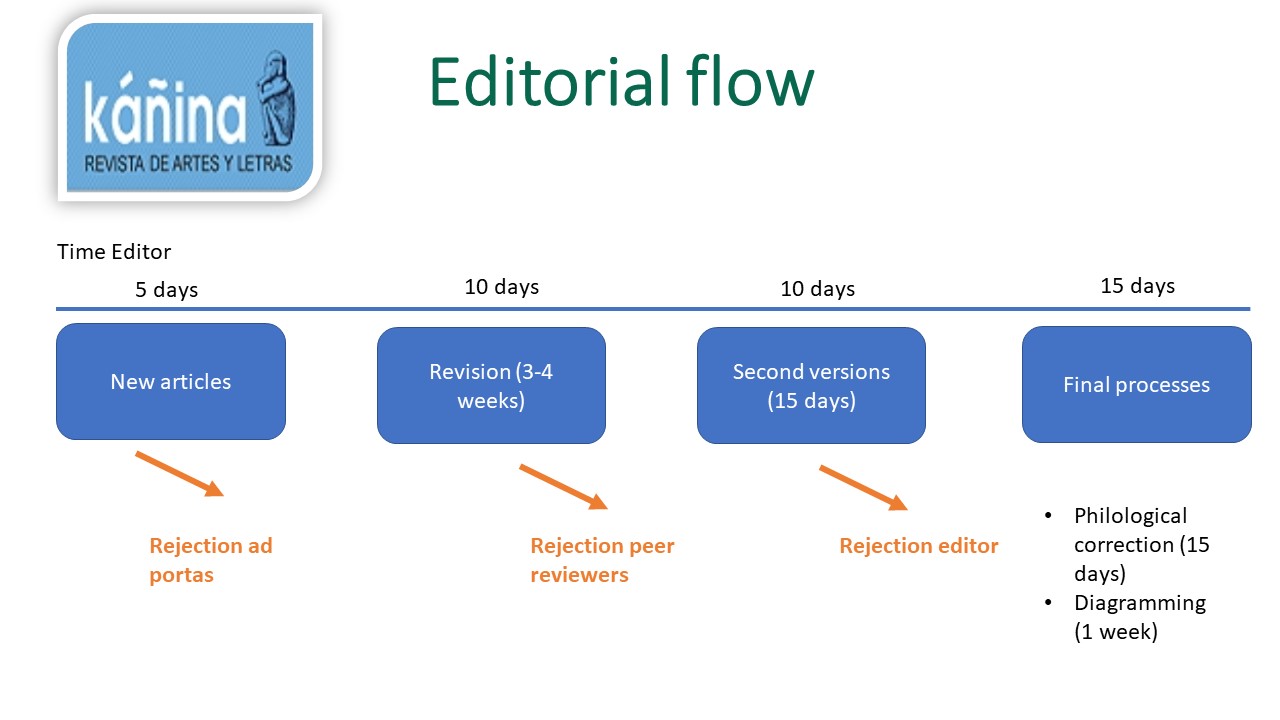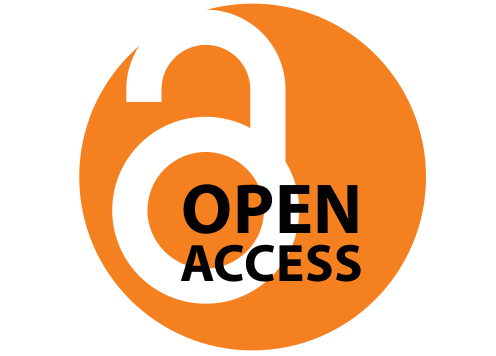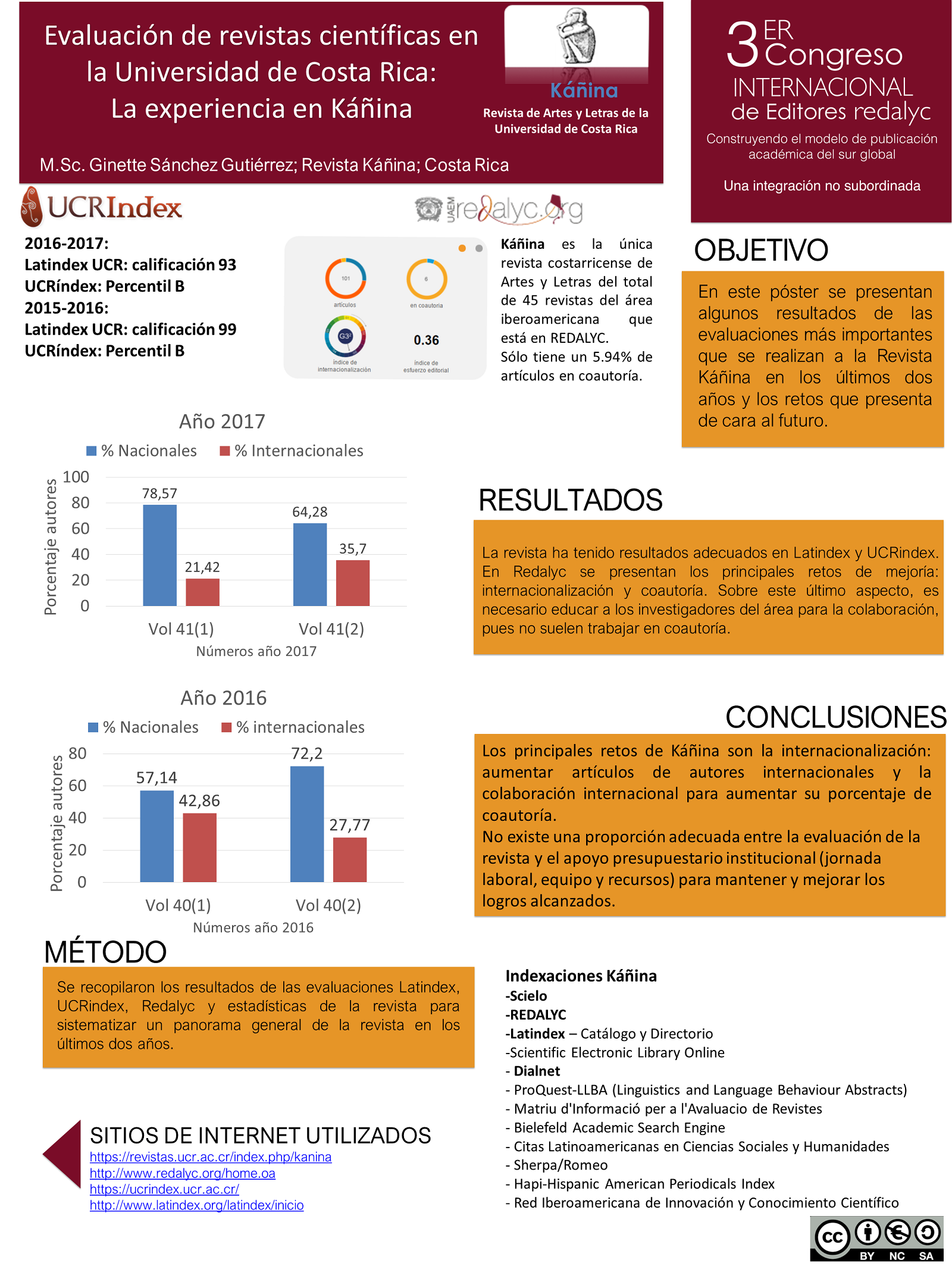Focus and Scope
Káñina, Journal of Arts and Letters of the University of Costa Rica, is a quarterly academic scientific publication on the subject of Costa Rican, classical and international literature and the arts in general. Its main objective is to publishe original and unpublished articles, scientific, theoretical and metatheoretical analysis on the area of arts and letters.
It is aimed at professionals of the arts and letters, academics and researchers, as well as students, both nationally and internationally. Since 1977, it has had an exchange with foreign universities, until its last printed publication in 2017. As of this year, Káñina becomes an electronic magazine exclusively, visible through the internet network and the various indexations with which it counts to obtain impact and visibility.
Peer Review Process
Káñina receives articles in digital format (Word Program for Machintosh or Word for PC 2010 or higher), which must meet the Standards for authors required by the journal. The author is notified of the receipt of his article and submits to a first revision of the format by the editorial team of the journal. Subsequently, the article is sent to two external reviewers, during a period of 3, 4 weeks. In some cases, the article are reviewed for one internal peer and one external.
If there are discrepancies in the criteria, it is sent to a third evaluation until there is a coherent and well-founded opinion of acceptance or rejection. The peer review is based on an evaluation format that is delivered to each external pair to complete and add their scientific criteria. The review process is double blind, to ensure an objective and scientific process. When the article is received, after a first revision of the format, it is derived to the reviewer, who does not know the identity of the author (a). Similarly, the author does not know the identity of the person who will evaluate your article. After the lapse of approximately 6 weeks, the author is notified of the result of the evaluation, informing him of the unanimous acceptance, with observations or rejection of his writing, as appropriate.
The author must send the second version of the article, corrected within the 10 days after receive the dictamination, with a few more days in some qualified cases. After 60 calendar days after receiving the results of the review process, if the corrected version is not send by the authors, the article will be archived. If the article is sent again, it will be considered as a new submission and the editorial process will start from the beginning.
This review process can be repeated in case there are corrections to the original article. In case the content of the article has a lot of graphic material, the author will be contacted to review and support the editing process of his article, providing the annexes with the highest quality required or reviewing details of special, phonetic or linguistic characters. If the Editorial Board detects that the article has been submitted simultaneously to another journal, it will immediately suspend its review and the author will be notified of its ethical lack and rejection of the article. The Editorial Board of Káñina has the final decision of acceptance or rejectionof the articles, based on the opinion of reviewers and the revision of format and style. Below a editorial flow diagram.

Káñina Evaluation guide for peers reviewers
Índexes, databases, catalogues, directories, repositories, harvesters
KÁÑINA in included in: SCIELO, REDALYC, DOAJ, DIALNET , ERIH PLUS, LATINDEX, Biblat, REDIB, BASE, Emerging Source Citation Index ESCI, EZB, CLASE, HAPI, SUDOC, COPAC, Ulrich´s Web Global Serials Directory, Academic Search Premier, Fuente Académica Plus, CIRC, REBIUN, LatinREV, MLA Sherpa Romeo, Crossref y en MIAR (ICDS: 10,0), Google Analytics, Google Scholar, AURA AMelica, Repositorio La Referencia , Journals for Free, ISIDORE
Reject rate
2022: 32%
2021: 32%
Publication Frequency
Káñina is a scientific journal that uses continuous publication organized by cuatrimestral issues (1st January- 30th April), (1st May- 30th August), (1st September-31 December). The articles will be published when they are ready, one by one until close the current number.
Reject rate
2022: 32%
2021: 32%
Open Access Policy
This journal provides immediate free access to its content under the principle of making research available to the public free of charge, which fosters a greater exchange of global knowledge. Therefore, no payments are requested to apply, process, publish or read articles in the journal.
Open access means the free availability on internet of articles published in Káñina, allowing anyone to read, download, copy, distribute, print, search or use for any legal purpose, not commercial, without technical or legal barriers, outside those that are inseparable from accesing the internet itself. The only limitation is in terms of making derivative works from the articles, for which permission must be requested from authors respecting the integrity of theirs works as the first unpublished and original publication en Káñina to respect the editorial management of this publication.

Digital Preservation Policy
This journal uses the LOCKSS system, created by Stanford University, to create an archive distributed among participating libraries. The system allows these libraries to create permanent archives of the journal for preservation and restoration purpose. The journal is also part of the PKP Preservation Network, which provides preservation for any OJS journal. Káñina also preserves archives in Drive, personal computer and pendrives.
Etics Policy and Good editorial practices
Káñina, is a journal of Arts and Letters, dedicated to dissemination of inedit and original scientific articles, essays, theoretical analysis and texts of literary creation. This journal studied several rules and standards such as; Committee of Publicaction Ethics (COPE), as well publishing practices of prestigious portals such as Scielo, Redalyc, Latindex and Thinkepi Group. Then, we have our own editorial ethic code. This code applies for authors, reviwers and editors.
For more information visit the link: http://publicationethics.org/files/All_Flowcharts_Spanish_0.pdf
Plagiarism detection Policy
This policy refers to the control over the ethics of the publication. The Management of the Journal will ensure that the Editorial Committee, the review team and authors comply with the ethical standards necessary in the publication process.
To detect plagiarism, it uses tools such as Google and Duplichecker. Pagiarism detection will be done before submitting the article for external peer review. The text is included in the Turnitin software, but it is also checked by Google and the editor and editorial asistant corroborate the correct citation of the sources and make a manual evaluation too.
There are some implications for the authors if plagiarism is detected. These depends on the type of plagiarism. For example: If the article is not original and was previously published in another indexed journal, it will be withdrawn from editorial process with a notification to th author. If plagiarism or ideas from cited authors is found, it is evaluated whether it is a simple omission of citation, in that case, the author is notified to correct that omissión inmediately. If it is a large amount of plagiarism text without citation, the article will be rejected and withdrawn from editorial process with the proper official notification. If omission of self-citation of the author is detected, the proper citation and bibliographic reference will only be requested if it is a previous research that is part of the current one. The Editorial Board evaluates all situations and gives a veredict according to the conditions in which plagiarism occurs and the moment in which the article is in the editorial process when it is detected.
As support we use the ethic politics about plagium published in the Handbook of Publications of the APA 7th version.
As general provisions, it is established that:
All articles sent to the journal Káñina must be original and unpublished. It must be of own authorship and distinct from any other document previously published by the same author (a) or that is under review in another journal or publication medium.
With the submission each author (a) must declare the originality and the assignment of the right of publication and non-commercial distribution in the journal, guaranteeing that the text is original, is not plagiarized, nor autoplaginated and has not been published in another medium.
When writing the theoretical concepts, clearly identified references should be provided when dealing with textual citation or paraphrasing. So there are no doubts about the origin of these concepts or background theories used in the studies. They should be clearly distinguished from each author's own elaborations about their own findings.
In research with human beings, the privacy of the participants must be respected, including the confidentiality of their identities, and only their informed consent must be indicated.
The results must be presented clearly, honestly and without manipulating, falsifying or producing the data in an inappropriate or false manner.
The methodology of unpublished research must be presented clearly and unambiguously, so that the results can be confirmed, analyzed and replicated by the scientific community.
Publications derived from a previous research project, thesis or second parts of a broad study must be clearly identified as such, recognizing the primary publication from which they arise.
For more information we recommend you check the following link: http://publicationethics.org/about
Sponsors
This journal has support of the Research Vice-rectory of the University of Costa Rica
Statistics
See below statistics about Káñina taken from Redalyc website: https://www.redalyc.org/revista.oa?id=442&numero=56519&tipo=indicadores
In next image there are some statistics about Káñina 2016-2017.


